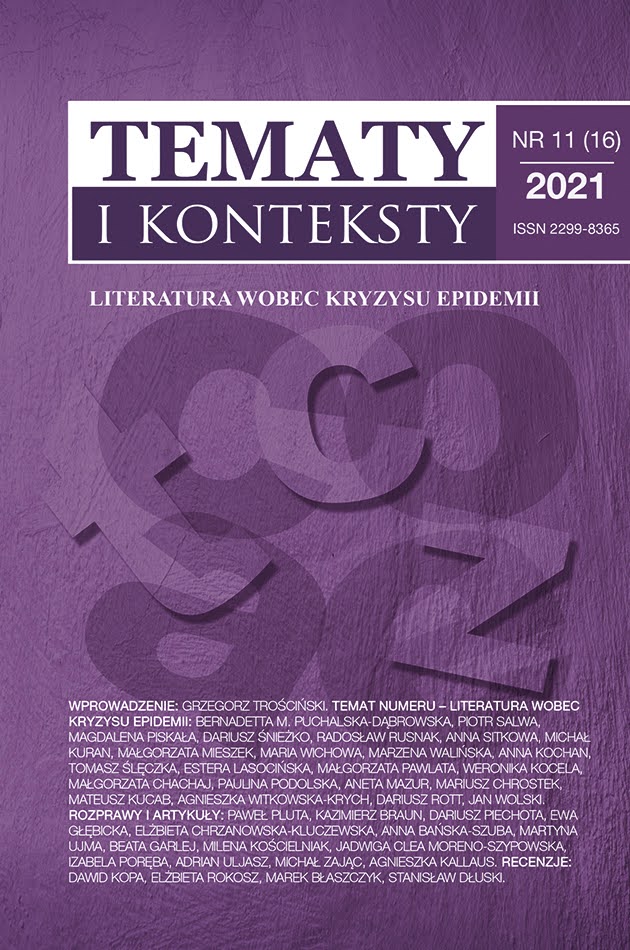"Parthenopea lues", czyli o ostatecznym rozstaniu z Lidią. Glosa do elegii III 17 Jana Kochanowskiego
DOI:
https://doi.org/10.15584/tik.2021.6Słowa kluczowe:
Neapol, Kampania, Jan Kochanowski, syfilis, poezja nowołacińska, Wojciech OczkoAbstrakt
Autor wskazuje i poddaje analizie wszystkie pojawiające się w twórczości Jana Kochanowskiego wzmianki o Neapolu i Kampanii, które odwiedzić miał okazję poeta w 1555 r. Jednym z takich przypadków jest pojawiające się w łacińskiej elegii III 17 sformułowanie"Parthenopea lues", które stanowi peryfrastyczne określenie syfilisu, choroby, jaka w czasach Kochanowskiego doprowadziła do śmierci wielu Europejczyków. Wzmianka ta wchodzi w obręb rozbudowanej tyrady wymierzonej w niewymienioną z imienia kobietę, która - zgodnie z żarliwie wypowiadanymi życzeniami podmiotu mówiącego - zapłacić ma srogą cenę za swe występki przeciwko miłości. A ostatnią, i najdotkliwszą z kar, jakie przyjdzie jej znieść przed finalnym pochłonięciem jej przez Tartar, ma być właśnie "morbus gallicus". W artykule rozważa się kwestię identyfikacji kobiecej protagonistki wiersza, biorąc pod uwagę istniejące na ten temat hipotezy. Opatruje się też komentarzem stosowny, poświęcony kile, passus elegii, zwracając uwagę a to na nieco osobliwe miano, jakie przydaje jej poeta, a to na wiedzę z zaskresu syfilitologii, którą dzieli się z czytelnikiem.
Downloads
Bibliografia
Belofsky N., Jak dawniej leczono, czyli plomby z mchu i inne historie, przeł. G. Siwek, Warszawa 2014.
Bogucka M., Gorsza płeć. Kobieta w dziejach Europy od antyku po wiek XXI, Warszawa 2005.
Borowicz S., Hobot-Marcinek J., Przybylska R., Anty-Beatrycze: studia nad kulturową historią obrazu pijanej i szalonej staruchy, Kraków 2016.
Buszewicz E., Semiotics of Old Age in Polish Neo-Latin Poetry. Samboritanus, Cochanovius, Treter, Sarbievius, Ines, „Symbolae Philologorum Posnaniensium Greacae et Latinae” 2017, XXVIII/2, s. 85–101.
Cynarski S., Zygmunt August, Wrocław 1988.
Dziechcińska H., Kobieta w życiu i literaturze XVI i XVII wieku. Zagadnienia wybrane, Warszawa 2001.
Erazm z Rotterdamu, Księgi, które zową Język, przeł. Anonim, wyd. J. Dąbkowska-Kujko, Warszawa 2019.
Faron B., Jak przetrwać zarazy w dawnej Polsce?, Kraków 2021.
Gajda Z., Do historii medycyny wprowadzenie, Kraków 2011.
Grześkowiak R., Kiła i Muzy. Syfilityczny epizod w twórczości Hieronima Morsztyna, w: Literatura piękna i medycyna, red. M. Gancarz, P. Wilczek, Kraków 2015, s. 47–68.
Ioannes Cochanovius: pisma łacińskie, oprac. zespół pod kierunkiem W. Waleckiego, Kraków 2008.
Kochanowski J., Carmina latina/ Poezja łacińska, cz. I: Fototypia – transkrypcja, wyd. i wstępem poprzedziła Z. Głombiowska, Gdańsk 2008.
Kochanowski J., Carmina latina/ Poezja łacińska, cz. II: Indeks wyrazów i form, oprac. Z. Głombiowska przy współudziale S. Głombiowskiej, Gdańsk 2008.
Kochanowski J., Fraszki, oprac. J. Pelc, Wrocław–Warszawa–Kraków 1999, BN I 163.
Korolko M., Jana Kochanowskiego żywot i sprawy. Materiały, komentarze, przypuszczenia, Warszawa 1985.
Kracik J., Staropolskie postawy wobec zarazy, Kraków 2012.
Kubicki J., Historia kiły, „Puls Uczelni” 2013, 7 (3), s. 37–39.
Langlade J., Jean Kochanowski. L’ homme – le penseur – le poète lyrique, Paris 1932.
Lenart M., Patavium, Pava, Padwa. Tło kulturowe pobytu Jana Kochanowskiego na terytorium Republiki Weneckiej, Warszawa 2013.
Łazarz R., Prostytucja renesansowa, przedstawienie zjawiska w traktatach a rzeczywistość, w: Miłość sprzedajna, red. B. Płonka-Syroka, K. Marchel i A. Syroka, Wrocław 2014, s. 65–87.
Łukaszewicz-Chantry M., Kobieta jako postać literacka w łacińskiej poezji renesansu. Italia i Polska, Wrocław 2014.
Magnuszewski W., Fraszka „Na Barbarę”, czyli o „szlachetnej nierządnicy”, „Litteraria. Prace Wrocławskiego Towarzystwa Naukowego” 1993, XXIV, seria A, nr 247, s. 5–35.
Mallett M., Shaw C., Italian Wars, 1494–1559. War, State and Society in Early Modern Europe, Abingdon–New York 2012.
Maludzińska M., Choroby weneryczne na ziemiach polskich w XVI wieku w świetle „Przymiotu” Wojciecha Oczki, w: Wśród córek Eskulapa. Szkice z dziejów medycyny i higieny w Rzeczypospolitej XVI–XVII wieku, red. A. Karpiński, Warszawa 2009.
Minois G., Ksiądz i lekarz. Od świętych uzdrowicieli do bioetyki, przeł. K. Kot-Simon, Warszawa 2020.
Morbi gallici novum ac utilissimum opusculum quo vera et omnimoda eius cura percipi potest P. Andrea Mattheolo senensi doctore praestantiss. auctore, [b.m., b.r.].
Niedźwiedź J., Poeta i mapa. Jan Kochanowski a kartografia XVI wieku, Kraków 2019.
Nowicka-Jeżowa A., Kochanowski tra i poeti che meditano sulla Roma eterna, w: tejże, Jan Kochanowski. Dieci saggi, Roma 2018, s. 188–190.
Oczko W., Przymiot i Cieplice, opatrzone życiorysem i oceną stanowiska naukowego W. Oczki przez E. Klinka oraz rozprawą o języku dzieł przez A. Kryńskiego, Warszawa 1881.
Pawlak W., Jan Kochanowski wobec starości, w: Dojrzewanie do pełni życia, red. S. Kruk, E. Flis-Czerniak, Lublin 2006, s. 87–97.
Quétel C., Niemoc z Neapolu, czyli historia syfilisu, przeł. Z. Podgórska-Klawe, Wrocław 1991.
Roberts N., Whores in History. Prostitution in Western Society, London 1992.
Rodríguez-Martín C., Historical Background of the Human Treponematoses, „Chungará” 2000, 32, n 2, s. 193–197.
Ruffié J., Sournia J.C., Historia epidemii. Od dżumy do AIDS, przeł. B.A. Matusiak, Warszawa 1996.
Rusnak R., „Elegii ksiąg czworo” Jana Kochanowskiego – w poszukiwaniu formuły zbioru, Warszawa 2019.
Rusnak R., Na co zmarła Orszula Kochanowska? O interpretacyjnym potencjale jednej metafory, „Pamiętnik Literacki” 2020, 111, z. 2, s. 183–188.
Spitzer L., The Etymology of the Term „Syphilis”, „Bulletin of the History of Medicine”, May–June 1995, 29, no. 3, s. 269–273.
Suchowierski H., Rozpoznawanie i leczenie chorób wenerycznych według „Przymiotu” Wojciecha Oczki, Kraków 1952.
Tafiłowski P., Wojny włoskie: 1494–1559, Zabrze 2007.
Urban W., Znaczenie kiły w dziejach Pierwsze Rzeczypospolitej, „Archiwum Historii i Filozofii Medycyny” 1997, 60, z. 1, s. 1–8.
Wielka encyklopedia medyczna, red. E. Cravetto, przeł. mLingua, t. 1–23, Warszawa 2011.
Wojtkowska-Maksymik M., Le poetiche visioni dei viaggi nell’elegia III 4 di Jan Kochanowski, w: Viaggio e comunicazione nel Rinascimento. Atti del XVII Convegno Internazionale (Chianciano Terme-Pienza, 16–18 luglio 2015), ed. L. Rotondi Secchi Tarugi, Firenze 2017, s. 473–481.
Pobrania
Opublikowane
Jak cytować
Numer
Dział
Kategorie
Licencja
Prawa autorskie (c) 2021 Tematy i Konteksty

Utwór dostępny jest na licencji Creative Commons Uznanie autorstwa – Użycie niekomercyjne – Bez utworów zależnych 4.0 Międzynarodowe.




